We’re excited to bring you a roundup of June 2019 fantasy book releases by and about women and nonbinary folk. Let us know what you’re looking forward to, or any titles that we’ve missed, in the comments!
Archive for books


Tasha Suri’s Empire of Sand rewrites our understanding of female agency
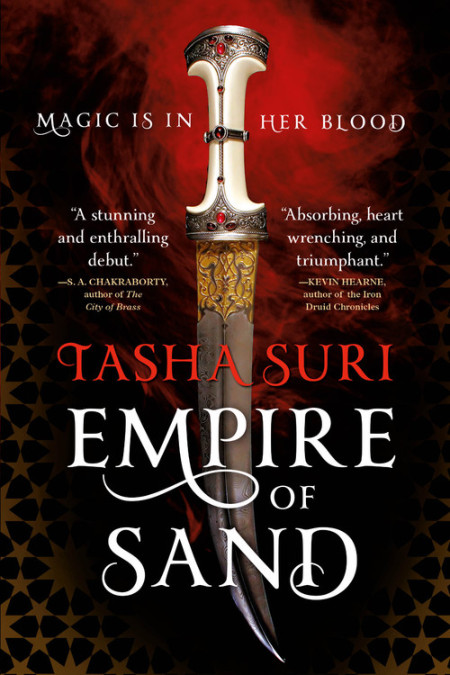
The first of Tasha Suri’s Books of Ambha series, Empire of Sand, is a stunning fantasy debut. The setting is inspired by Mughal India, ranging from court culture to a desert nomad lifestyle, and the worldbuilding is thorough, immersive, and unique. And it has romance, dancing magic (dancing! magic! TAKE MY MONEY), politics, world-destroying stakes, and women coming into their power.
In short, in terms of sheer features, it includes basically all my favorite things, and that alone would have been enough for me to be shouting about Empire of Sand. (I will keep my exclamation points and all caps-pronouncements to a minimum henceforth, but please appreciate it requires Heroic Restraint.)
But there is so much more to shout about. Because as much as I delight in epic stories of fantasy romance and dancing magic, those features are not what make this book so noteworthy and so special to me.
I love this book, first and foremost, because of how thorough and nuanced its approach is on the matter of choice.
In Empire of Sand, choices are complicated. They’re hard. Even when choices are technically available, this is a book that is very aware of the pressures that constrain truly “free” choice. This is a book that understands that even people with the best of intentions and love in their hearts can’t always do what they want for the people who matter to them. This is a book that understands that there are pressures—from society, family, and your own hopes and dreams and fears—that circumscribe the freedom of choices. This is a book that understands that choices have costs, and sometimes making the choice at all is part of it. And it understands what all this means for women in particular.
The Ambhan people have conquered the Amrithi, and Mehr—who has parents from both backgrounds—attracts the attention of the Ambhan emperor’s mystics with her Amrithi powers. She is effectively forced to give up her sacred right to choose (or not choose) a husband, in order to save a family that has put her in the impossible position of being unable to reconcile her heritage. She does find love, but even that is complicated: how can you give or withhold real consent when someone else is commanding your actions?
How Empire of Sand examines how earnest, open, wholehearted, and selfless that love is and can be, and how it can change everything and nothing, is one of my favorite parts. Stories with characters who exercise compassion even when it’s hard beyond belief are a particular favorite of mine. Suri does an especially fantastic job of handling consent within the confines of an oppressive system. Love doesn’t magically negate the effects of oppression, but it helps them survive it. The romantic arc of this story is absolutely gorgeously done, and I will say no more on that lest I ascend once more into all caps and exclamation points.
Mehr’s journey to owning her own power is inseparable from her learning to navigate disparate identities. Her parents, who are of two different worlds and cultural heritages, were ultimately unable to reconcile their own differences and can neither help Mehr do so nor help her learn the fullness of one or the other. Mehr reconciling all the parts of her background—what to let go of, what to hold, and how to handle not just the expectations of people around her but her own—is critical to becoming her fully empowered self.
Finally, in stories rooted in western frameworks, agency is portrayed as character actions that shape the plot. There is an argument that this is why, historically, so many fantasy books are about kings, chosen ones, knights, and wizards, and, let’s be honest, generally straight cisgendered men: the people with the ability to make choices that change their worlds.
But that leaves us with such a limited scope of stories. In Empire of Sand, Suri gives us something else: a story about a character—a woman—not with no ability to choose, exactly, but a woman whose agency and choices stem from a point of survival. And the kind of character Mehr is, as well as the world she lives in, broadens our understanding of romance and agency in what truly makes a hero.
So. Do you want beautifully wrought non-western fantasy settings? Do you want numinous dancing magic and romance you can cheer for with your entire being? Do you want women who grapple with fundamental, impossible choices, own their power, and change their worlds?
Then you want Empire of Sand.
Casey Blair is an indie bookseller who writes speculative fiction novels for adults and teens, and her weekly serial fantasy novel Tea Princess Chronicles is available online for free. She is a graduate of Vassar College and of the Viable Paradise residential science fiction and fantasy writing workshop. After teaching English in rural Japan for two years, she relocated to the Seattle area. She is prone to spontaneous dancing, exploring ancient cities around the world, wandering and adventuring through forests, spoiling cats terribly, and drinking inordinate amounts of tea late into the night.

Why inclusive heroism is not just suggested, but essential
Sirens Newsletter—Volume 11, Issue 5: May 2019
This month:
- What does heroism mean to Roshani Chokshi?
- Sirens Studio Faculty Spotlight
- 2019 Books and Breakfast Selections
- Programming proposal submissions are officially closed…
- Sirens Community Round-up
- Start your summer with these 66 new books this month
What does heroism mean to Roshani Chokshi?

“To me, heroism is the act of celebrating the individual. There’s not a one-size-fits-all when it comes to the Chosen One.” – Roshani Chokshi
Continuing our series of getting to know this year’s guests of honor, this month we’re getting to know our first ever Sirens Studio guest, Roshani Chokshi, known for the Star-Touched series, the Pandava series, and The Gilded Wolves.
In our interview, Roshani extolls most eloquently the way a hero’s weakness is possibly more important than her strength. And while storytelling may have created important bridges in her own identity, it took some overcoming to insert herself into her own narratives. Jae Young Kim, from the Sirens review squad, praises Roshani’s tales in her review of Aru Shah and the End of Time, and our community rallies to share their favorite sarcastic animal sidekick in fantasy in our #SirensIcebreaker.
If you finish Roshani’s books and need to get cozy in some more of her work, visit this list we put together here, or check out some of her book recommendations here. We also advise poking around on her enticing website, roshanichokshi.com, or be floored by the most glamorous of fantasy author Instagrams!
Sirens Studio Faculty Spotlight
If you haven’t yet signed up for the Sirens Studio, well, why not? Faculty this year include:
-
For reading workshops: teacher and author Nia Davenport, Soho Press Associate Publisher and brand-new debut author Juliet Grames, Dr. Jen Michaels, and Sirens Guest of Honor Rebecca Roanhorse
-
For writing workshops: Sirens Guest of Honor Mishell Baker and author and illustrator Nilah Magruder
-
For career development workshops: agent Sara Megibow and media industry executive vice president (and Sirens co-founder) Amy Tenbrink
This month, we interviewed fabulous faculty member, Nilah Magruder, who will lead the writing development workshop “The Visual Narrative: Developing Illustrated Projects and How to Write Like an Artist” this fall. Nilah discusses finding inspiration sources for her artistic styles, teaching writers to bridge narrative and visual story, and who she still needs to send copies of her books to. [Note from Erynn: Nilah’s How to Find a Fox is the only book on the Sirens reading list my toddler has finished. He recommends.]
2019 Books and Breakfast Selections
Each year, Sirens showcases the breadth and complexity of our annual theme through our Books and Breakfast program. We select a number of popular, controversial, and just plain brilliant books that address aspects of our theme, and then attendees bring their breakfast and join a table to discuss one of those books—another chance to deconstruct, interrogate, and celebrate the work that women and nonbinary authors are doing in fantasy literature!
For 2019, we’ve selected eight 2019 Books and Breakfast titles that we hope will expand your definition of who might be a hero or what acts you consider heroic. Toward that end, we’re highlighting four areas in this year’s selections: religion, race, gender/sexuality, and body—and please note that some titles sit on multiple axes, not just the one they’re listed under!
2019 BOOKS AND BREAKFAST SELECTIONS
Religion
The Sisters of the Winter Wood by Rena Rossner
Race
Future Home of the Living God by Louise Erdrich
Gender/Sexuality
The Tiger’s Daughter by K. Arsenault Rivera
Body
Gullstruck Island by Frances Hardinge
Click here for more on our Books and Breakfast program and this year’s selections, including a detailed spotlight on The Bird King and The Sisters of the Winter Wood!
Programming proposal submissions are officially closed…
…and the vetting board is hard at work reading all the amazing submissions. Fist bumps of gratitude to everyone who sent in proposals! Decisions will be made and relayed to you by email by June 12th. If you have any questions in the meantime, send them to (programming at sirensconference.org).
Sirens Community Round-up
For her book club this month, Amy Tenbrink reviewed Claire Legrand’s Furyborn, with exceptional praise on the satisfaction from a “competent” book, on the blog and Goodreads.
From our Sirens Review Squad, Lily Weitzman put together this list of seven short stories to refresh readers in need of variety, and Jo O’Brien’s review of Kiersten White’s The Dark Descent of Elizabeth Frankenstein, a companion to Mary Shelley’s classic, envisions the struggle to break free from toxicity and reclaim personal power.
Scroll through the official Sirens Twitter feed to admire all the geeky treats from the May the Fourth Sirens Meet-up in Denver! Other Sirens satellite parties joined up in New York and Seattle this month. For those who will be in Boston on June 6th or D.C. on June 22nd, click here to get the scoop on those meet-ups.
Start your summer with these 66 new books this month
By clicking on our collage of May’s new fantasy books!
Erynn’s Pick:
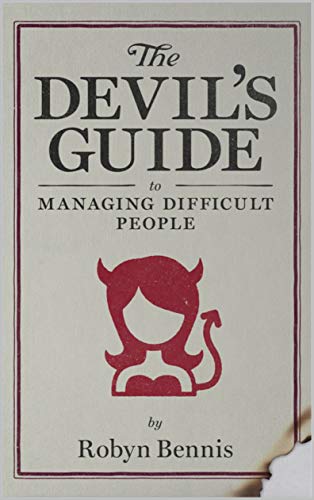
“I met the devil at a Motel 6, poolside.”
Cheeky author and Sirens attendee Robyn Bennis has delightfully captured the misanthropic esprit de 2019 with The Devil’s Guide to Managing Difficult People. Jordan is stuck in a bleakly entertaining deal with the devil that is highly relatable. If it’s at all like her previous novel The Guns Above, I expect great characters and battles on top of the humor.
Faye’s Pick:
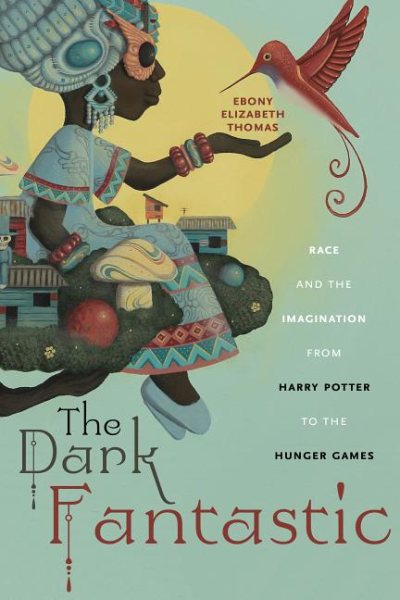
Dr. Suzanne Scott mentioned it in her book round-up last month, and I’ll definitely be checking out Ebony Elizabeth Thomas’s The Dark Fantastic, a detailed analysis of the diversity—and lack thereof—in children’s books, television, and film. Thomas’s scholarly work traces the narratives of four black female characters in four popular fandoms: Bonnie Bennett from the CW’s The Vampire Diaries, Rue from The Hunger Games, Gwen from the BBC’s Merlin, and Angelina Johnson from the Harry Potter series.
This newsletter is brought to you by:

Questions? Concerns? Please email general queries to (help at sirensconference.org) and questions about programming to (programming at sirensconference.org).

Your 2019 Books and Breakfast selections featuring inclusive heroism
In an earlier post, we explain in depth why our 2019 conference theme is heroes, and how we’re not only re-examining what kind of individual is welcomed as, or even permitted to be, heroic, but also how heroic actions differ from the hegemonic norm. We demand heroes of all genders, all sexualities, all races, all sizes, all abilities. And to further that aspiration, we’ve selected eight 2019 Books and Breakfast titles that we hope will expand your definition of who might be a hero or what acts you consider heroic. Toward that end, we’re highlighting four areas in this year’s selections: religion, race, gender/sexuality, and body—and please note that some titles sit on multiple axes, not just the one they’re listed under!
So you might get a head start on reading, here is the full list of 2019 Books and Breakfast selections. We’ll also be featuring more of these books in more detail throughout the coming months, starting with our religion titles below.
2019 BOOKS AND BREAKFAST SELECTIONS
Religion
The Sisters of the Winter Wood by Rena Rossner
Race
Future Home of the Living God by Louise Erdrich
Gender/Sexuality
The Tiger’s Daughter by K. Arsenault Rivera
Body
Gullstruck Island by Frances Hardinge
RELIGION SELECTIONS
The origin of modern fantasy literature is often traced back to Christian writers of the late 19th century, with heroes who are male and cisgender, living or transported to a feudal setting with roots in medieval western Europe. So many heroes are either explicitly or implicitly Christian—and so often, those of other faiths are explicitly or implicitly villainous. In 2019, we want to examine heroes from other faiths, and for our Books and Breakfast religion picks, the two titles are G. Willow Wilson’s The Bird King and Rena Rossner’s The Sisters of the Winter Wood.
The Bird King by G. Willow Wilson
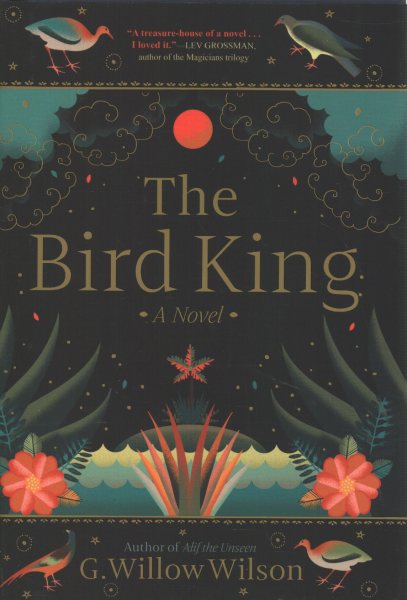
Much has been said about G. Willow Wilson’s sumptuous new novel. Set in 1491 in Muslim Granada during the last sultanate’s reign, The Bird King begins with the imminent arrival of the Spanish Inquisition and its attendant persecution. But first, readers are introduced to Fatima, the sultan’s favorite concubine, and Hassan, the royal mapmaker with a secret magic—for he can shape reality out of the maps he draws, even places he’s only dreamed of. Hassan’s gift is highly prized, especially for moving the sultan’s armies in wartime, but used for not much else except for amusing a bored Fatima who has never set foot outside the palace.
When the Inquisition arrives, Fatima knows Hassan’s gift will be seen as sorcery. And when it’s inevitably discovered, the two friends go on an epic journey, over land and sea, mythos and heart, fleeing torture and death, to find the island of the Bird King. To find refuge in a place that, for all they know, might be completely imaginary. After all, they only know it from stories—and the stories that they’ve told each other for years in comfort—stories that help Fatima escape from her bondage and Hassan from his supposed deviancy of loving other men.
Stories, we know, are everything. The Bird King knows this too. What Wilson layers on is truly spectacular: the poisoned effects of colonialism, the interpretation of reading and sacred texts, religious freedom and exclusion, magic entwined with folklore, an exploration of refuge and community, and a thoroughly kickass, strong-willed, hypocrisy-exposing, angry, Muslim hero in Fatima. To give you a taste, when the sultan asks her what more she could want, with her fancy clothes, limitless entertainment, fancy food, and his favor, she replies, “To be sultan.”
—Faye
The Sisters of the Winter Wood by Rena Rossner
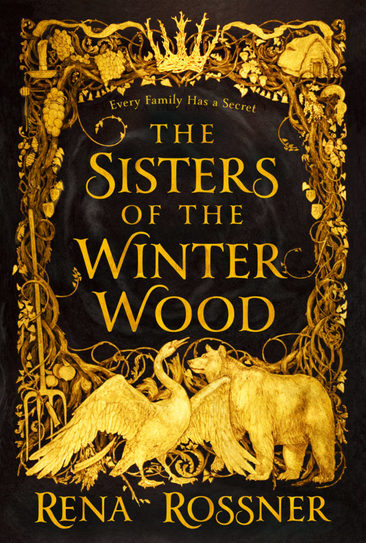
The original draft of The Sisters of the Winter Wood was simply a fantasy retelling of Christina Rossetti’s “Goblin Market.” But as author Rena Rossner recounts, “[W]hen I finished my first draft, I realized that my book didn’t have a soul…I had originally set it in an imaginary town called Blest, in France, but I realized that I needed to find a new setting, something that felt more real—authentic to who I was.” In re-drafting, Rossner found the soul of her book in Dubossary, a shtetl on the border of Moldova and Ukraine, where Rossner’s grandfather’s family lived—and where, on the eve of a pogrom, Jewish residents resisted and forestalled tragedy.
Against this background, including the averted pogrom, Rossner’s tale becomes explicitly Jewish: Sisters Liba and Laya are the daughters of a learned Jew, himself the son of a rabbi, and an aristocrat who loved him so much that she forsook her intended betrothed and converted to Judaism. This is a book built on details, and readers will first note the details of the family’s everyday Jewish life: the prayers, the food, the courting rules. But Russian influence lives in Rossner’s work as well, again in the details: Liba and her father can both shape-shift to bears, apparent through Liba’s ravenous hunger and inconvenient claws; Laya and her mother shift to swans, all discarded feathers and a yearning to fly.
If you’ve ever read Rossetti’s “Goblin Market,” you know what comes next: lushly ripe fruit, irresistible kisses, and ultimately danger of the sort that girls know all too well. The book is told through alternating viewpoints: Laya’s daring free verse, filled with her curiosity and bold desire for adventure, and Liba’s more staid prose, as she frets, worries, and ultimately makes the choices that will save her sister. This is a retold fairy tale in all its glory: myth and legend trap the unwary, choices and danger abound, and one girl, with so much strength derived from her faith, saves the day.
—Amy

Five Books that Roshani Chokshi Loves
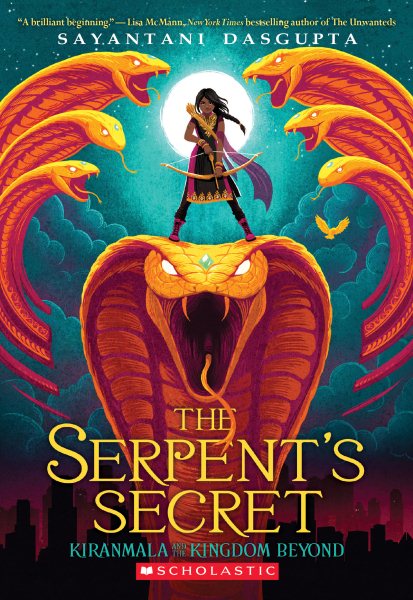
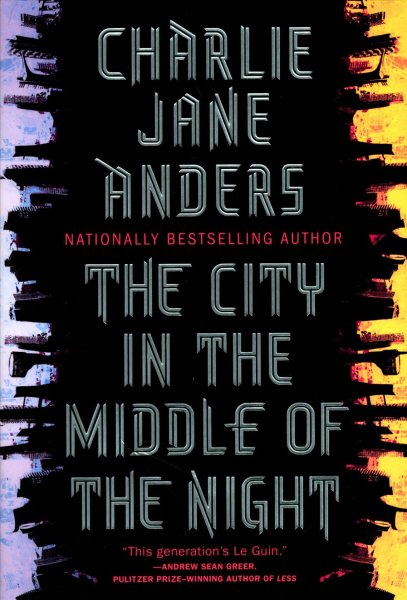
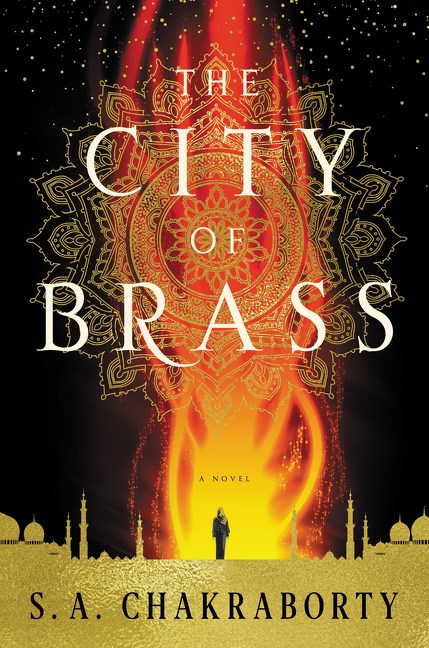
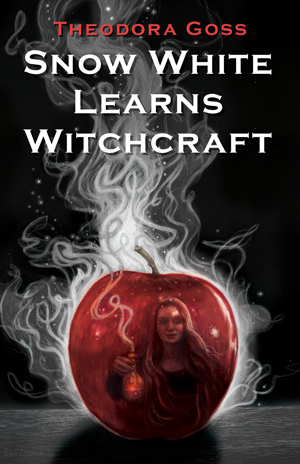

Roshani Chokshi is the New York Times bestselling author of the Star-Touched series and Aru Shah and The End of Time, Book #1 in the Pandava series. She grew up in Georgia, where she acquired a Southern accent but does not use it unless under duress. She has a luck dragon that looks suspiciously like a Great Pyrenees dog. Her work has appeared in Strange Horizons, Uncanny Magazine, Shimmer, and Book Smugglers. She is a 2016 finalist for the Andre Norton Award, and a 2016 Locus finalist for Best First Novel. Her short story, The Star Maiden, was longlisted for the British Fantasy Science Award.
For more information about Roshani, please visit her website or her Twitter.

Roshani Chokshi’s Aru Shah and the End of Time subverts patriarchy from the very beginning
The Sirens Review Squad is made up of Sirens volunteers, who submit short reviews of books (often fantasy literature by women authors) they’ve read and enjoyed. If you’re interested in sending us a review to run on the blog, please email us! Today, in honor of Roshani’s Guest of Honor week here at Sirens, we welcome a review from Jae Young Kim on Roshani Chokshi’s Aru Shah and the End of Time.
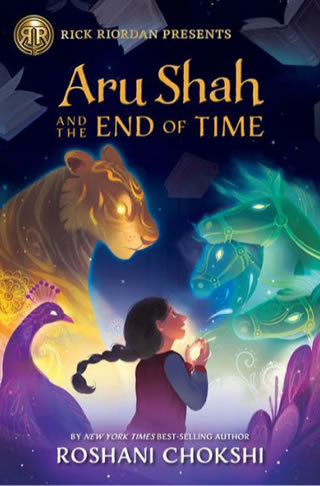
Roshani Chokshi’s middle grade debut, Aru Shah and the End of Time, is delightful from start to finish. I am not even mad that Chokshi ended the book on a wicked cliffhanger, because it means she has to give us a sequel! (Book two, Aru Shah and the Song of Death, came out on April 30, and it’s on the top of my to-be-read pile.)
Twelve-year-old Aru Shah thinks she’s just an ordinary middle schooler trying to fit in. One day, on a dare, she rubs a cursed lamp and discovers she is, in fact, the reincarnation of one of five Pandava brothers, semi-divine heroes of a famous Hindu epic—and she must save the world. Mild spoilers ahead, but they are on the book’s jacket copy and are revealed very early on.
Chokshi dives deeply into the rich world of Hindu mythology, introducing gods, demons, beasts, and magic that is exciting, weird and fun. I love all mythology and fairy tales, so for me, this was an easy sell. It’s also not a surprise that a book curated by Rick Riordan on his Rick Riordan Presents imprint tells a story with mythology bursting from every page. But Chokshi adds her own stamp on a very old story. I am very glad that she chose to have the brothers be sisters. How can someone be reincarnated hundreds of times and always be male? Patriarchy, of course, but to have Chokshi subvert that from the very beginning was deeply gratifying.
And it’s not only important that Aru is a girl, she’s an Indian-American girl. As a Korean-American girl, I would have loved to see girls of color accepted without question as heroes— nay, heroines—of the story. I had read books with white girls as protagonists, but that meant ignoring an important part of myself, being Korean. Aru is not only a girl but an Indian girl, and her identity deeply informs how she interacts with the world around her.
The diasporic aspects of this re-telling were compelling for me but may be a mixed sell for others. Reimagining demons as hair stylists and night bazaars as Costco is just fun, and as one character in the book notes, “families moving to new countries and imaginations evolving” means adapting and changing. But Aru still maintains traditions like not eating beef, as a Hindu, or pranama, touching the feet of elders, or immediately calling all Indian women auntie upon meeting them. Since I am also of the Korean diaspora, I appreciate the references to American pop culture, and the unique take on mythology and culture from that lens, while still maintaining traditions of our families. Chokshi tells us the stories she’s loved and heard many times, but provides context for the readers. The one minor gripe I have is that some of the references feel a bit dated, like Johnny Cash and Die Hard, and may resonate more with adults than children. I say this only because I understood all of the American pop culture references, and I am definitely not twelve years old.
My favorite part of Aru Shah and the End of Time, though, is Aru and her found family. She meets a fellow Pandava sister, Mini, very early on and the development of their relationship is amazing. I love romance storylines, and out of most of my reading, I don’t often see a family and friend relationship celebrated as much as Chokshi’s Aru and Mini. It’s clear that Aru and Mini becoming sisters is just as important as their quest to save the world.
If you love friendship stories, sibling stories, reimagined Hindu mythology, and just plain fun, Aru and Mini’s adventures will crack you up and warm your heart. So run, don’t walk to the bookstore and be glad you get to jump right into the sequel when you’re done!
Jae Young Kim is a born-and-bred New Yorker and a lifelong fan of fairy tales, fantasy and science fiction. She is a non-profit attorney by day and writes when she can, not always by night. The only thing that keeps her up until dawn these days is a good book.

Book Club: Furyborn by Claire Legrand
Each year, Sirens chair Amy Tenbrink posts monthly reviews of new-to-her fantasy books by women and nonbinary authors. You can find all of her Sirens Book Club reviews at the Sirens Goodreads Group. We invite you to read along and discuss!
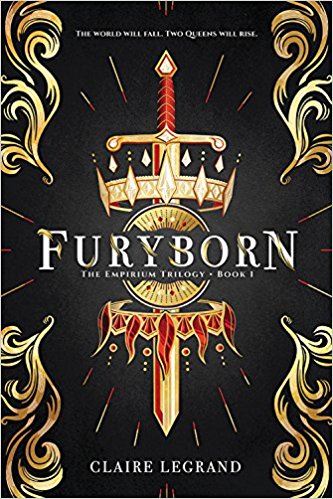
The word “competent” means having the necessary ability, knowledge, or skill to do something successfully. (I looked it up!) But that’s not how we use it, is it? When we say someone is competent, we mean they’re fine, I suppose. They’re good enough. They’ll do. As if having the necessary ability, knowledge, or skill to do something successfully is not, in fact, success.
I think, societally, we underestimate competence. We underestimate how much work and skill it requires. We underestimate its value. We underestimate its importance. And I think much of this underestimating comes from the fact that competence is so often quiet.
Instead, we value any number of flashier things: talent, danger, a metaphorical or even literal high-wire act. As if, simply by instilling challenges or drama or a 30-foot drop into the process, the outcome will be more satisfactory. More successful.
I’ve been considering this recently for any number of reasons, not the least of which is watching the United States’ 2020 presidential campaign season roll out appallingly early. And while so much of so many things is gendered, even putting that aside, we—societally—would rather an Icarus than an Ariadne. Better to fly too high and perish than to quietly get shit done. Better to shout platitudes from a metaphorical mountaintop than to offer a workable, detailed plan.
And that goes for our media as well. I watch a ton of reality television, much of it competition reality shows. But I recently realized the profound difference between watching Top Chef or MasterChef and watching Ina Garten or Martha Stewart cook. The former is designed for fireworks: appliances that don’t work, forced partnerships, ingredients that no one should ever have to combine. In many ways, the show is the player’s antagonist, just as much as the other contestants. These shows are competitive, challenging, exciting—but they’re also very much designed for our “go big or go home” society, to elicit spectacular success and spectacular failure.
Conversely, have you ever sat down and watched Martha Stewart bake? Not with a guest, where she’s quite happy to show you her competitive side. (Her dirt cake is better than yours.) But just watched Martha, in a kitchen, by herself, doing what she does incredibly well?
It’s profoundly comforting, even relaxing. Sitting on your couch, watching a hyper-competent woman do what she does best. Nothing is going to go wrong. The oven will work, the ingredients will be there, the cake will not be burned, the decorating will be glorious. This experience—this experience of having a predictably successful outcome—is what we devalue, what we elide, what we gloss over and play down and underestimate. The pleasure of watching someone do something that they’re great at, no muss, no fuss, no fireworks, no disasters, just a dang beautiful cake.
I tell you this so that you will understand what high praise it is when I tell you that Furyborn is gloriously, magnificently competent.
Claire Legrand’s Furyborn is the first in the high-fantasy Empirium Trilogy. In the world of Avitas, legends tell of seven saints, each of whom mastered an element of empirium, which seems to be little magical particles that float around like golden dust motes. Even in the today of the immediate story, certain people have an affinity for one of those elements: sun, shadows, fire, and so on.
But prophecy tells of two women who will be able to master all seven elements, one queen of sun and one queen of blood. One seemingly good, one seemingly bad. One will save the world, one will destroy it. And so on. You all read a lot of fantasy: You know how this prophecy thing goes.
And after the usual sort of prologue that assures you that things will get very bad before the end, the book opens with Rielle, a lady of Celdaria, who is a pretty typical fantasy teen: She wants to skip her lessons, ride illegally in a horse race, and fuck the prince. Good for you, Rielle. But you find out pretty early on both that Rielle can wield all seven elements and that that fact is an unpleasant surprise to the (mostly male) leadership of Celdaria. She seems to be a queen of prophecy, but which one?
Rielle’s story is one of a headstrong girl, stifled all her life, told to keep her power secret and safe, told to stand aside as the boy she loves weds another. It’s the story of a grief-stricken girl who accidentally killed her mother years ago, which also cost her a relationship with her father. It’s the story of an immensely powerful girl who is still told that she is less: dangerous, uncontrollable, unpredictable—but that she can redeem herself by agreeing to use her power only to serve the king.
Rielle’s story is our story. And as so many of our stories do, Rielle’s story goes horribly wrong. Too many hot boys, too many overhearing men, too many people trying to control her rather than train her, trying to force her to do the right thing rather than supporting and trusting her.
But Rielle’s story is not the only story. Across the sea, 1,000 years later, we have Eliana, the Dread of Orline, seemingly crafted for all the Lila Bard fans of the world.
Eliana’s father is dead, her mother is disabled, her little brother is adorable, and she’s the sole breadwinner for her family. Which she does by catching and killing rebels for the Emperor. She’s not always happy about it, especially when best friend-and-lover Harken prods her about it, but it puts food on the table. Oh, and her body can magically heal itself. She is, for the record, both a woman of color and bisexual, though her on-page sex is only with men.
Eliana’s story blows wide open when, on the same night, her mother mysteriously disappears and she encounters the Wolf, a deadly rebellion operative. She strikes a bargain with him, which she regrets at least half a dozen times, and ends up making her way through the Red Crown revolution, picking up pieces of the puzzle along the way.
If Rielle’s story of power stifled is the one we live every day, Eliana’s story of power wielded is one we dream every night. While Rielle and Eliana are similarly angry and similarly mouthy, that reads as obstinance and disobedience in Rielle’s story, but as danger and sass in Eliana’s.
Legrand tells her story in alternating point-of-view chapters, which many of you know is a bit of a bee in my bonnet. Here, it’s frustratingly worse, because those alternating point-of-view chapters are set 1,000 years apart, and Legrand must compensate not only for the usual loss of momentum by shifting characters, but the additional challenge of shifting entire plotlines. Which she does by making each chapter, more or less, a cliffhanger, which makes for compulsive, if somewhat aggravatingly so, readability.
But, people, this book is competent. The world is good, the characters are good, the plot is good, the magic is good, the writing is good. And even better, the third rails that have been blowing up my enjoyment of an awful lot of young-adult high fantasy lately aren’t here. The worldbuilding makes sense: There are no absurdist canons, like a world that can have this but not that, a king but not a queen, a fall but not a spring. The characters aren’t hateful: Though both Rielle and Eliana are surrounded by too many men telling them what to do, most of the time they fight back, assert themselves, do what they want to do. While both Rielle and Eliana have unexplained powers, the magical rules stick and we don’t learn late in the game about that one last power that will help them save the world. (At least not yet. There’s no world-saving in book one.)
And what a lovely reading experience it was. About 100 pages in, when I realized that nothing was going to go horribly wrong in the reading process, that I could just relax and read the book…I just relaxed and read the book. What a delight. What a joy. What competence.
Amy Tenbrink spends her days handling strategic and intellectual property transactions as an executive vice president for a major media company. Her nights and weekends over the last twenty-five years have involved managing a wide variety of events, including theatrical productions, marching band shows, sporting events, and interdisciplinary conferences. Most recently, she has organized three Harry Potter conferences (The Witching Hour, in Salem, Massachusetts; Phoenix Rising, in the French Quarter of New Orleans; and Terminus, in downtown Chicago) and nine years of Sirens. Her experience includes all aspects of event planning, from logistics and marketing to legal consulting and budget management, and she holds degrees with honors from both the University of Southern California’s Thornton School of Music and the Georgetown University Law Center. She likes nothing so much as monster girls, Weasleys, and a well-planned revolution.

7 Works of Short Fiction Well Worth Savoring
Over the last few years, I’ve found myself increasingly drawn to shorter fiction. I still love novels of course, but shorter stories feel refreshing, with a wealth of innovative, progressive work currently being published. The more I read, the more I admire stories that establish their setting and characters—and evoke a distinctive voice—concisely enough to fit in a slim volume. Here are some novellas, novelettes, and collections of micro-fiction that I recommend.
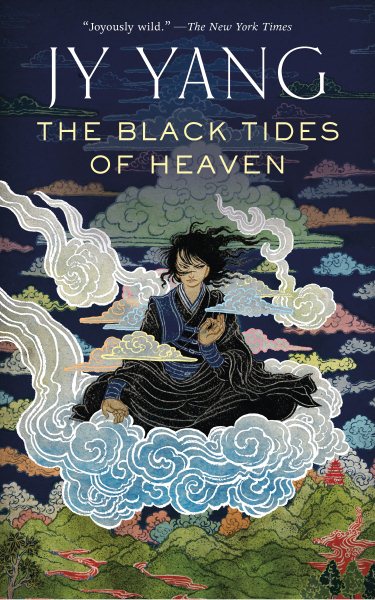
This first volume in the consistently excellent Tensorate series follows the growth of Akeha and their twin, Mokoya, as they develop their magical abilities and reckon with their life as the child of an oppressive ruler. Yang lays out a vivid magic system, vibrant characters, and a lived-in world where gender is not assigned but settled upon. They especially excel at evoking their characters’ complex relationships and a sense of melancholy.
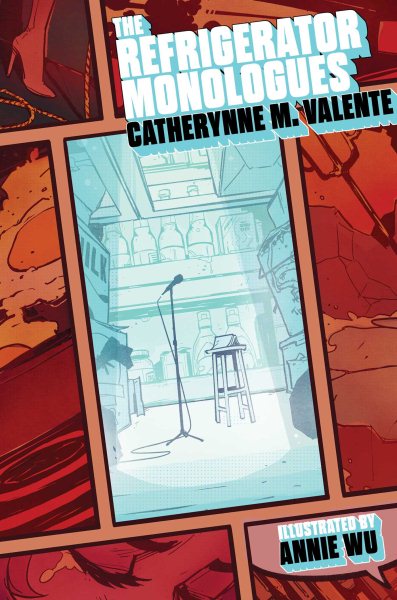
Killed off or degraded to further the stories of male superheroes, the fridged women of Deadtown are angry. Now, from the afterlife, they tell their own stories. Based closely off the ordeals of well-known comic-book women, these stories crackle with the wit of Valente’s wordplay and the expression of pent-up anger. An in-depth knowledge of the original comics isn’t necessary, though a general familiarity with superhero tropes is helpful.
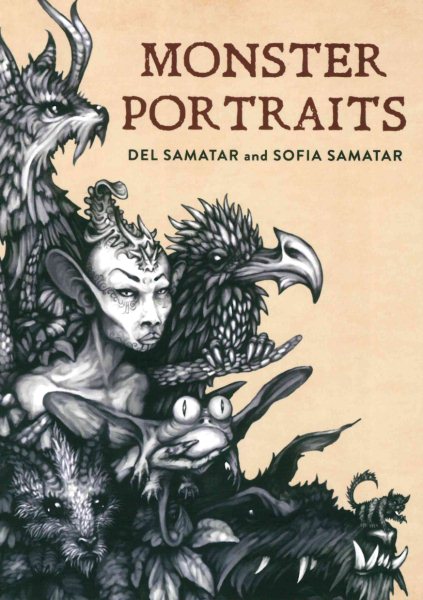
Two siblings set out on an expedition, an exploration of the concept of monstrousness, in a work that blends the real and the fantastical in a way I have never quite experienced before. Profiles of the Green Lady or the Kryl glide into reflections on biracial identity. This illustrated book is many things, and trying to pin it down would only diminish it. As I write about it, I am drawn back to see what insight reveals itself on a second reading.
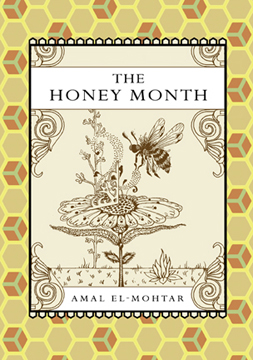
What would you do if given a selection of honey samples, one for each day of the month? For El-Mohtar, the answer was to write a poem or piece of micro-fiction inspired by each variety, playing with different subjects and forms. Together, the pieces create an ethereal, sometimes eerie atmosphere: I imagine the denizens of faerie reciting them to each other. I enjoyed reading one entry per day over the course of a month—an echo of how The Honey Month was created.
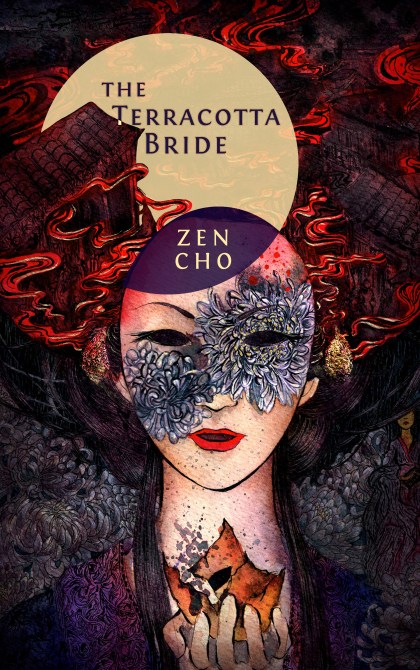
When Siew Tsin’s wealthy husband brings home a new bride made of terracotta, Siew Tsin’s existence in the Chinese afterlife is bound to change. The Terracotta Bride blends folklore and the fantastical with the quotidian, depicting an afterlife full of both bureaucracy and intrigue. In this novelette, Cho employs her direct prose to bring out both humor and a bittersweet mood.
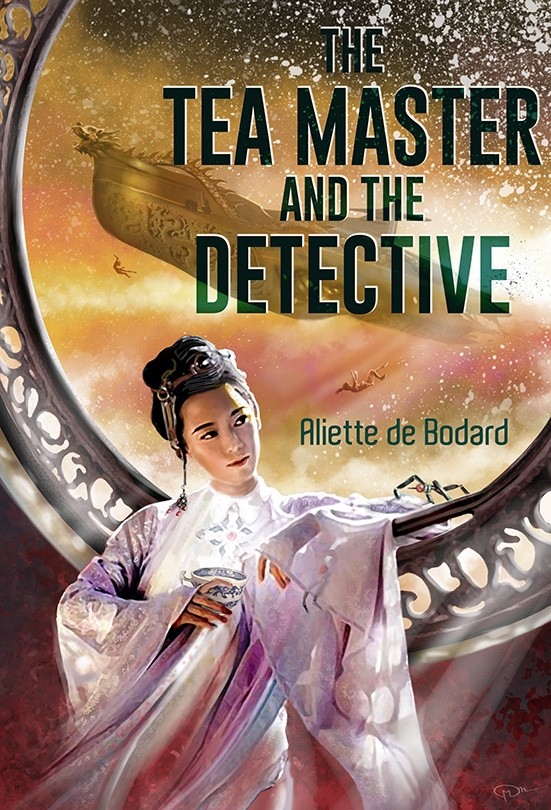
A sentient transport ship, traumatized from a recent war, is struggling to make rent by blending teas for people traveling into deep spaces. Enter the abrasive Long Chau, consulting detective and potential client. Yes, this story takes inspiration from Sherlock Holmes, but it also inhabits its own rich world. An excellent blend of homage to that source and original storytelling, this novella was my introduction to de Bodard and makes me want to read more of her work.
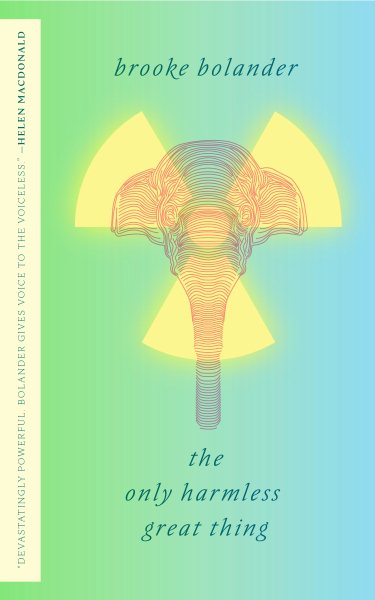
This story of memory and resistance spans perspectives and time periods, from a worker with radiation poisoning and her elephant coworker, to the researcher considering how to warn future generations about radiation, to elephant storytellers. Each perspective is unique and piercing, though the most brilliant voice is that of the elephants and their matriarchal, story-centered culture. This novelette is both devastating and illuminating.
Lily Weitzman is a programming, outreach, and communications librarian at the Public Library of Brookline, MA. That means that on any given day, she might be found leading a poetry reading group, managing the science fiction and fantasy collections, teaching technology skills, or helping you find the title of that book you heard about on public radio. She has previously worked on a Yiddish oral history project and volunteered as an aquarium educator. Outside the library, Lily chairs the Yiddish Committee at Boston Worker’s Circle.

Kiersten White’s Elizabeth Frankenstein breaks the shackles that bind her to her abuser
The Sirens Review Squad is made up of Sirens volunteers, who submit short reviews of books (often fantasy literature by women authors) they’ve read and enjoyed. If you’re interested in sending us a review to run on the blog, please email us! Today, we welcome a review from Jo O’Brien on Kiersten White’s The Dark Descent of Elizabeth Frankenstein.
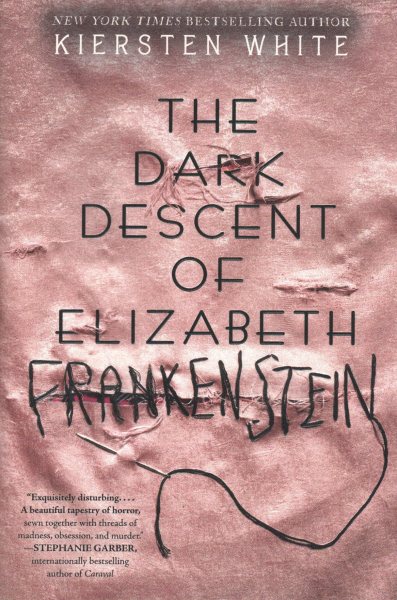
Mary Wollstonecraft Shelley was a stone-cold badass.
Her intellect and imagination were monumental. She invented a whole genre of literature when she was a teenager by writing a story that, two hundred years later, is still a cultural touchstone. And that’s to say nothing of the adventurous life she led—she climbed glaciers, sailed Lake Geneva, and traversed Europe, partially on foot when she didn’t like her chauffeurs. She survived the grief when death claimed her parents, two of her children, her half-sister, and then her husband. She kept Percy Shelley’s calcified heart wrapped in his poetry after he died.
But yet, Percy continues to be credited for her accomplishments. His “corrections” in the margins of a found draft of Frankenstein still have some people convinced that he must have at least been a co-author (never mind that his part seems to just graze the level of line edits). Some would even go as far as to say that genesis of the book, or even the very idea, belong to him. Even now, Mary Shelley isn’t given the respect she deserves for her work.
So it feels like it’s about time for The Dark Descent of Elizabeth Frankenstein. Author Kiersten White calls it a retelling, but I found myself thinking of it as a companion to the original Frankenstein: a different perspective, dissecting the events and uncovering truths that Victor Frankenstein couldn’t—or wouldn’t—divulge. The Dark Descent is narrated by Elizabeth Lavenza, the child purchased by Victor’s parents to temper his strange, violent behavior.
At the opening of the book, Victor, attending university, has fallen out of contact with his family. Elizabeth—having grown up alongside Victor as his primary caretaker and companion—follows him across Europe, determined to marry him and secure her position. She finds him indisposed in a rented warehouse, where he’s done the terrible, impossible thing that was the subject of Shelley’s original book. After seeing that he’s taken care of medically, she goes through his notes. She discovers what he’s done, and she foresees the reaction if his work is discovered. So she burns the evidence. She manipulates witnesses. She makes sure that Victor can return home without facing any consequences for his actions, just as she’s always done.
All this paints a bleak picture of a girl straining to make her way in a world where she can’t stand on her own, and The Dark Descent is, in some ways, a bleak book. Elizabeth is slow to realize her mistakes, because her conviction that she has to protect Victor is so well-trained. It feels familiar to how we are all trained to shelter those in power from the consequences of their toxic behavior. But there are moments that glimmer through, and they accumulate and accelerate. Elizabeth does learn. This is a book about a girl breaking the shackles that bind her to an abuser.
It is slow, painful work. Elizabeth doesn’t know that it needs to be done. She doesn’t know that she can unlearn her resentment of other women as rivals, or her too-quick instinct to cover Victor’s tracks. Things get worse before they get better. But Elizabeth is not the soft girl that Victor and his family believe she is. She is fierce and defiant and capable of her own terrible and impossible things. As her limits are stretched, she stretches to fill the gaps.
Just like Mary Shelley had to.
The Dark Descent is not just a companion to Frankenstein, it is an homage to Shelley herself. It’s about a girl whose tremendous abilities are credited to the men in her life. But it’s also about how, leveraging her own incredible power, she breaks free of them.
I won’t spoil the ending of The Dark Descent of Elizabeth Frankenstein, but I will say that, in order over the last several pages, I felt heartbreakingly satisfied, and then I gasped, and then I sobbed. (I’ll also say that it’s been a long time since I read any book that used the graphic formatting of a single page to such spectacular effect.) The novel is moody, atmospheric, and often difficult, but I felt it in my bones.
Victor Frankenstein, in his arrogance, told us one story. Elizabeth now claims her voice to tell another. And what she’s telling us is that there is no one more powerful than a girl who will fight to have something that’s hers.
Jo O’Brien is a writer, artist, cosplayer, mythical creature, and Viking who lives in northern Colorado, wrangling a host of familiar spirits. She writes about ambitious, unrepentant, sometimes vicious women in novels and for live steel horse theater. She has been a member of the Sirens community since 2011.









































































































































Connect with the Sirens community
Sign up for the Sirens newsletter